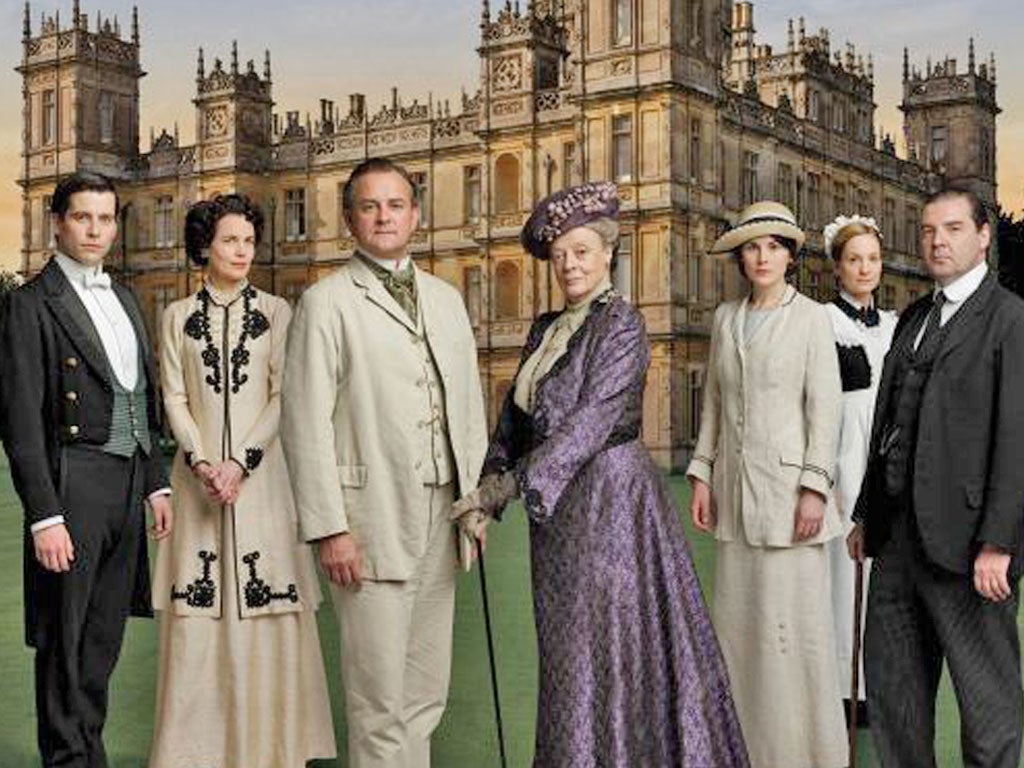The Weekend's Viewing: The Downton Abbey Implausibility Cup winner is announced
Downton Abbey, Sun, ITV1 // Obama: What Happened to Hope? Sun, BBC2 // JFK's Road to the Whitehouse: Primary 1960, Sun, BBC4

The contest has been stiff, but with the final extended episode of Downton Abbey out of the way, we can now announce the winner of the Annual Downton Implausibility Cup, a coveted trophy awarded to the least likely phrase to issue from a character's mouth in any one series.
The jury was divided for a time over the merits of two candidates, both of them making their appearance this week as a result of Thomas's exposure as a footman-fondling invert. But in the end, Bates's rebuke to Jimmy – "Why do you have to be such a big girl's blouse about it?" – narrowly lost out to the jaw-dropping moment at which Lord Robert shared memories of youthful scrapes with his valet: "If I'd shouted blue murder every time someone tried to kiss me at Eton, I'd have gone hoarse in a month!" he said, indignant at the prospect of losing one of his best bats before the all-important cricket match with the village.
All was well in the end, I'm glad to say, not something we can any longer take for granted after Sybil's brutal sacrifice to the gods of narrative surprise earlier in the season. Even as Robert crouched behind the wicket in the closing minute of the drama, you wondered whether a bad bounce might send us spinning into Season Four with a skull fracture and coma. But in the event there was no cliff-hanging event, Julian Fellowes choosing instead to stitch up all kinds of fluttering loose ends. Thomas's fate hung in the balance for an hour or so – because of O'Brien's somewhat mysterious machinations – but after a slightly startling outbreak of broadmindedness on both sides of the green baize door, he was not only reprieved but promoted to under-butler. Lady Mary's secret gynaecological operation (do try to keep up) went well so she's letting Matthew get beyond a chaste kiss again. And Lady Edith took advantage of a most useful service offered by the Telegraph, calling up the paper's information desk to get a dossier on the public and private life of her new editor, who had been giving her the glad eye. She was dismayed to discover that he was married but almost instantly relieved by the discovery that it's to a confined lunatic. Best line? Results are skewed by the fact that Maggie Smith can make virtually anything sound good. But I liked her response to Isobel's accusation that if she'd had to "sell Charlie to the butcher to be chopped up for stew" to achieve her ends, she would have done so. "Well... happily it was not needed," replied Lady Violet.
American politics fans limbering up for tomorrow's late-night endurance event were given two opportunities to stretch their muscles last night, first with Andrew Marr's film Obama: What Happened to Hope? and then with an opportunity to see Robert Drew's 1960 film about the Wisconsin Primary fight, JFK's Road to the Whitehouse: Primary 1960. Marr's film wasn't quite a political obituary for its subject but it made no assumptions about his survival either, and spread the blame for the disillusion felt by many voters between Obama's inexperience and introversion (he's better at thinking than schmoozing) and a combination of Republican malice and historical bad luck.
One adviser recalled turning to him after a terrible economic forecast he received in the first weeks in office and saying it was probably the worst briefing a President-elect had received since Lincoln.
"That's not even my worst briefing this week," Obama replied. Drew's film, an early exercise in behind-the-scenes documentary access, reminded you that Kennedy had campaigned on a hope theme too (Sinatra customising "High Hopes" as a stump song), and that the euphoria and glamour that surrounded his youthful candidature prefigured that experienced by Obama.
In Kennedy's case, hope was assassinated before it could die of natural causes. Obama may yet have the opportunity to pull it out of intensive care.
twitter.com/tds153
Subscribe to Independent Premium to bookmark this article
Want to bookmark your favourite articles and stories to read or reference later? Start your Independent Premium subscription today.

Join our commenting forum
Join thought-provoking conversations, follow other Independent readers and see their replies